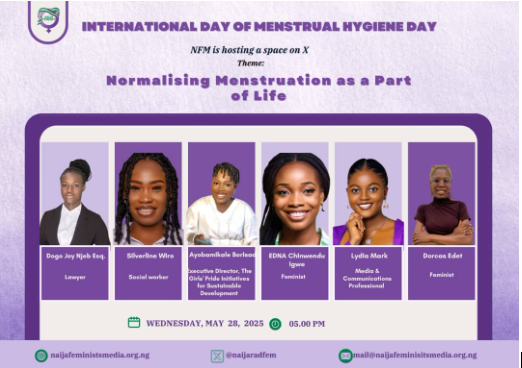
|
Getting your Trinity Audio player ready...
|
To commemorate Menstrual Hygiene Day 2025, Naija Feminist Media (NFM) hosted a Twitter Space on May 28, 2025, with the theme “Normalising Menstruation as a Part of Life.” The Space drew over 100 listeners and created room for an inclusive dialogue on menstruation, stigma, and menstrual equity.
NFM’s executive assistant, Joy Funmilola Oke, moderated the conversation.
Opening the conversation, Dorcas Edet, a feminist and gender justice advocate, emphasised the importance of normalising menstruation and how menstrual stigma is deeply connected to gender inequality, cultural beliefs, and societal expectations.
“Women are told that their bodies are defiling and should be hidden. They believe it, teach their daughters, and this builds a wall of taboo,” she said.
Dorcas discussed how inadequate school facilities, period poverty, and misinformation impact girls’ education, self-esteem, and future economic empowerment. She stressed the need for schools to provide proper menstrual care facilities, free sanitary pads, and an environment that supports menstruating girls without shame.
She also highlighted harmful cultural beliefs where menstruating women are not allowed to cook, pray, or participate in daily life because they are seen as impure.
Lawyer and rights advocate Dogo Joy Njeb Esq. addressed the absence of specific laws protecting menstruating women in Nigeria. However, she pointed out that some broad legal provisions, such as Section 16 of the Labour Act (which allows for 12 days of paid sick leave per year) and Section 13 of the VAPP Act (which prohibits isolation), can be applied to support menstrual rights. She called for legal reform and better enforcement mechanisms to ensure menstrual equity in schools and workplaces.
Media and Communications Professional Lydia Mark spoke from personal experience, stating that menstruation should be viewed like any other health condition and not a source of shame. She pointed out how stigma is common even among health professionals and emphasised the need for menstrual education, access to period kits in schools, and menstrual leave policies at workplaces.
Lydia also advocated for removing taxes on menstrual products, so that they can be more affordable for all. Menstrual health advocate Ayobamikale Borisade shared how her personal struggles growing up in a rural community, where she had to use tissue and cloth during menstruation, deeply impacted her. These experiences inspired her to become a menstrual health advocate. Her volunteer work with girls in Ondo State revealed how widespread period poverty remains, despite one-off pad donation drives.
She also debunked common menstrual myths, such as women being unable to cook, touch holy objects, or speak publicly about their periods.
Social worker Silverline Wiro spoke about the challenges girls face in River State, where menstruating women are still barred from certain places and activities due to traditional beliefs. She shared her own experience of not learning about menstruation until age 16 and stressed the importance of comprehensive menstrual and reproductive health education in families and school curricula.
Silverline called for consistent sensitisation efforts through radio, community outreach, and digital spaces like X to break the cycle of stigma and shame.
In closing, Dorcas Edet urged a reinterpretation of religious and cultural beliefs that menstruation is impure. She encouraged the public to hold religious and community leaders accountable for what they teach and to recognise the work NGOs are doing to reach and educate girls.
Responding to a question on advice for girls who feel ashamed of their menstruation, Dorcas said:
“It’s natural. Nature is good. There’s no need to be ashamed. Love yourself and don’t be afraid to seek help.”
Dogo Joy added that society should drop euphemisms and use proper terms when discussing menstruation or women’s sexual and reproductive topics.
This X Space featured important and timely discussions on menstruation, shedding light on the daily challenges girls and women face. It emphasised that more work is needed to create a society where menstruation is safe, shame-free, and openly supported, allowing girls and women to live without fear or stigma.






